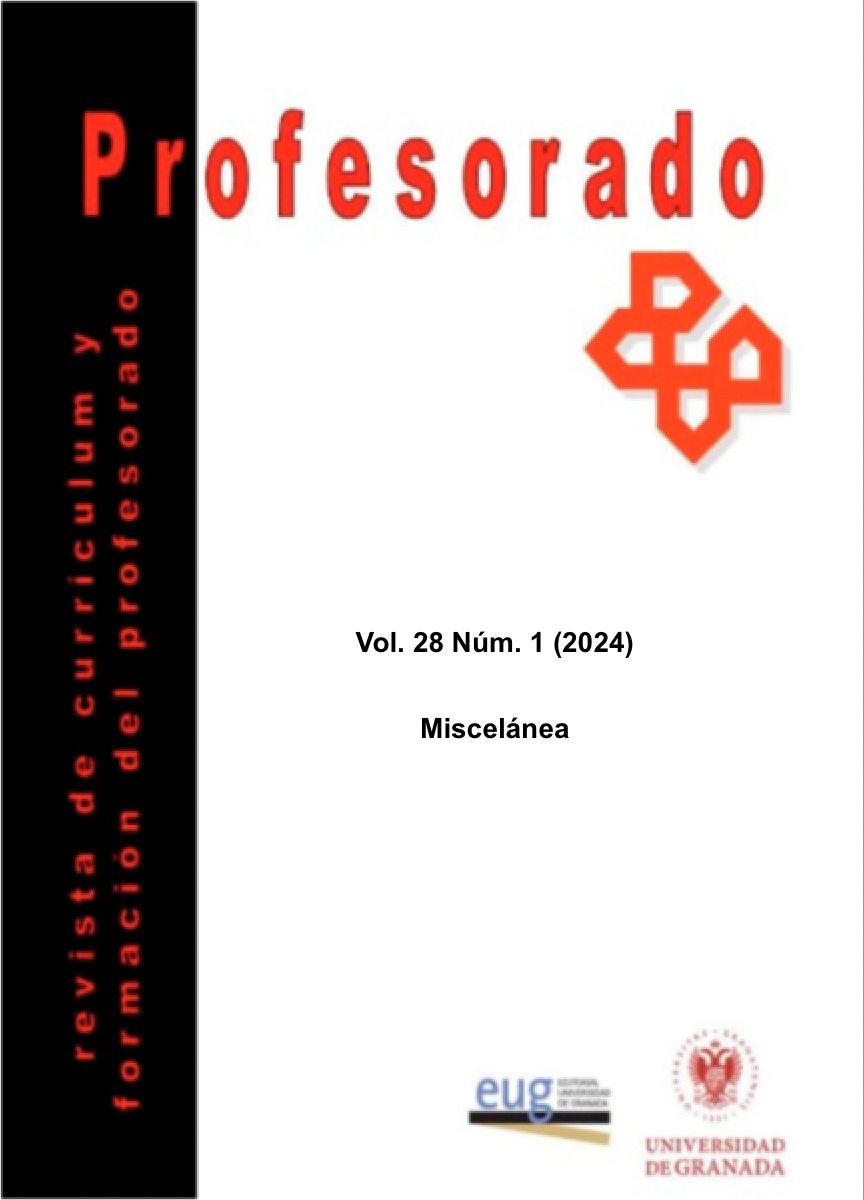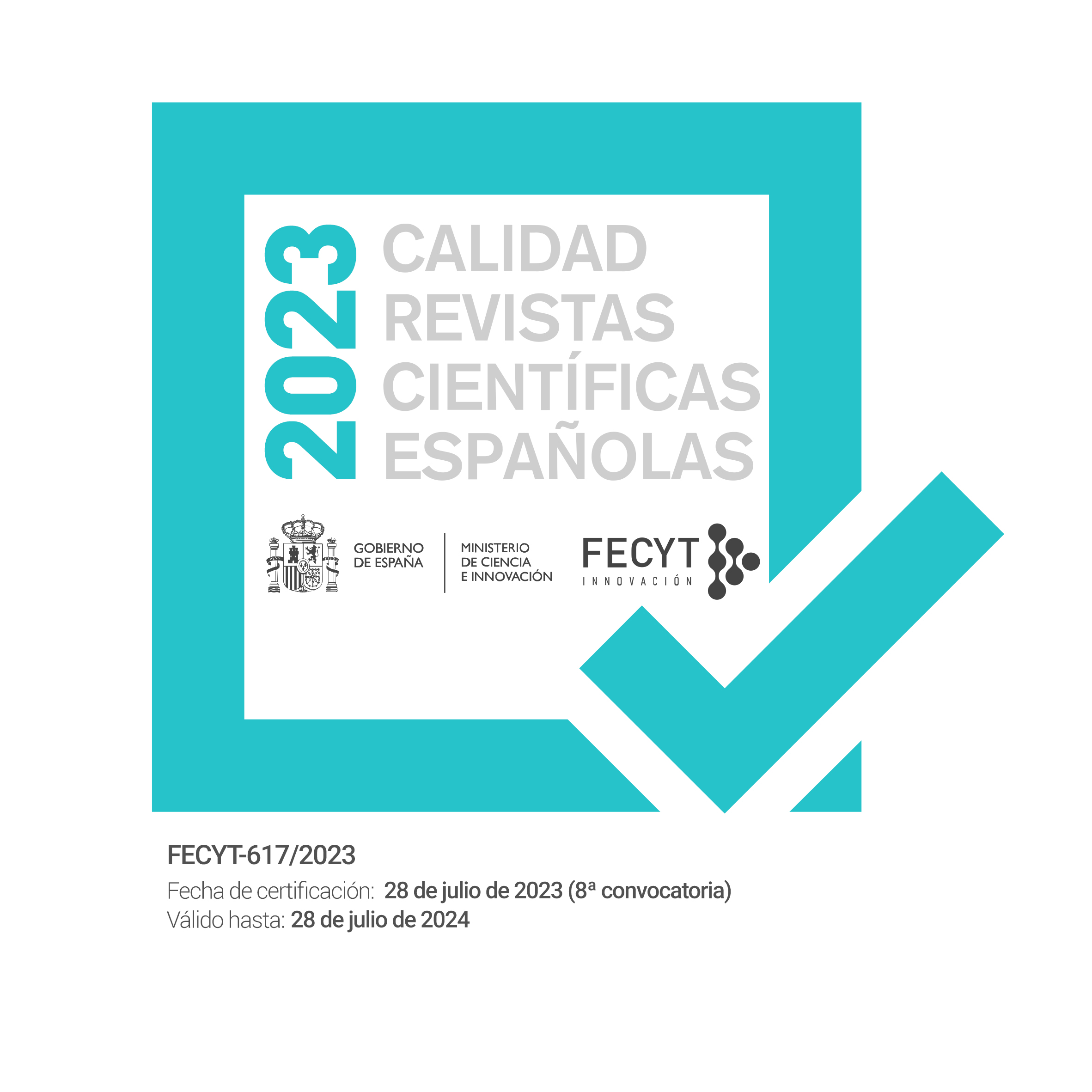Barreras en la cooperación entre familias y escuelas: una revisión sistemática
DOI :
https://doi.org/10.30827/profesorado.v28i1.28356Mots-clés :
Barreras, implicacion parental, familias, escuelas, revisión sistemáticaRésumé
La evidencia científica de los últimos 50 años pone de manifiesto que la colaboración mutua entre las familias y las escuelas repercute de forma clara en la mejora de la calidad de vida de niños, niñas y adolescentes. Sin embargo, estas comunidades no siempre encuentran el modo de comenzar o mantener buenos cauces de cooperación. Con el objetivo de identificar barreras que dificultan la cooperación entre las familias y las escuelas se desarrolló una revisión sistemática de literatura. Del total de 635 publicaciones, 19 artículos fueron seleccionados por cumplir con los criterios de elegibilidad. Los resultados mostraron la existencia de 49 barreras que se agruparon en cinco categorías: relacionadas con las familias, con las escuelas, con el estudiantado, con la corresponsabilidad entre familia-escuela y, por último, las sociopolíticas. La heterogeneidad de las barreras identificadas plantea la necesidad de que cada centro educativo elabore su propio plan de actuación de cooperación desde una perspectiva ecológica. A partir del análisis de los resultados se presentan iniciativas que pueden ayudar a optimizar en las relaciones entre las familias y las escuelas con la meta de promover entornos que satisfagan las necesidades para el desarrollo infantil.
Téléchargements
Références
Las referencias marcadas con un asterisco (*) indican que han sido incluidas en la revisión sistemática.
Addi-Raccah, A y Grinshtain, Y. (2021). Teachers’ professionalism and relations with parents: teachers’ and parents’ views. Research Papers in Education, 37(6),1142-1164, https://doi.org/10.1080/02671522.2021.1931949
Álvarez, L. (2019). Modelos teóricos de implicación educativa familiar: responsabilidades compartidas entre centros educativos, familias y comunidad. Aula Abierta, 48(1), 19-3. https://doi.org/10.17811/rifie.48.1.2019.19-30
*Anastasiou, S. y Papagianni, A. (2020). Parents’, teachers’ and principals’ views on parental involvement in secondary education schools in Greece. Education Sciences, 10(3), 1-12. https://doi.org/10.3390/educsci10030069
*Baker, T.L., Wise, J., Kelley, G. y Skiba, R.J. (2016). Identifying Barriers: Creating Solutions to Improve Family Engagement. School Community Journal, 26(2), 161-184.
Barger, M.M., Kim, E.M., Kuncel, N.R. y Pomerantz, E.M. (2019). The relation between parents’ involvement in children’s schooling and children’s adjustment: A meta-analysis. Psychological Bulletin, 145(9), 855-890. https://doi.org/10.1037/bul0000201
*Bellibas, M.S. y Gumus, S. (2013). The Impact of Socio-Economic Status on Parental Involvement in Turkish Primary Schools: Perspective of Teachers. International Journal of Progressive Education, 9(3), 178-193.
Bengtsson, M. (2016). How to Plan and Perform a Qualitative Study Using Content Analysis. Nursing Plus Open, 2, 8-14. https://doi.org/10.1016/j.npls.2016.01.001
Bolivar, A. (2006). Familia y escuela: dos mundos llamados a trabajar en común. Revista de Educación, 339, 119-146
Bronfenbrenner, U. (Ed.). (2005). Making human beings human: Bioecological perspectives on human development. Sage Publications.
*Camacho-Thompson, D.E., Guillen-O´Neel, C., Gonzales, N.A. y Fuligni, A.J. (2016). Financial strain, major family life events, and parental academic involvement during adolescence. Journal of Youth and Adolescence, 45(6), 1065-1074. https://doi.org/10.1007/s10964-016-0443-0
Chrispeels, J. (1996). Effective schools and home-school-community partnership roles: a framework for parent involvement. School Effectiveness and School Improvement, 7(4), 297-323. https://doi.org/10.1080/0924345960070402
Christenson, S. (2004). The family-school partnership: An opportunity to promote the learning competence of all students. School Psychology Review, 33, 83–104. https://doi.org/10.1521/scpq.18.4.454.26995
*Cole, S.M. (2021). Contextualising parental involvement at the elementary level in Jamaica. International Journal of Early Years Education, 29(2), 139-153. https://doi.org/10.1080/09669760.2020.1777844
*Cranston, J., Labman, S. y Crook, S. (2021). Reframing Parental Involvement as Social Engagement: A Study of Recently Arrived Arabic-Speaking Refugee Parents´ Understandings of Involvement in their Children´s Education. Canadian Journal of Education, 44(2), 371-404.
*Cross, F.L., Rivas-Drake, D., Rowley, S., Mendez, E., Ledon, C., Waller, A. y Kruger, D.J. (2019). Documentation-status concerns and Latinx parental school involvement. Translational Issues in Psychological Science, 5(1), 29-41. https://doi.org/10.1037/tps0000184
*Cureton, A.E. (2020). Strangers in the school: Facilitators and barriers regarding refugee parental involvement. The Urban Review, 52(5), 924-949.
Elo, S., Kääriäinen, M., Kanste, O., Pölkki, T., Utriainen, K., y Kyngäs, H. (2014). Qualitative Content Analysis: A Focus on Trustworthiness. SAGE Open, 4(1). https://doi.org/10.1177/2158244014522633
Epstein, J.L. (2001). School, family and community partnerships-preparing educators and improving schools. Boulders, CO.
Fantuzzo, J., Tiger, E., y Childs, S. (2000). Family involvement questionnaire: a multivariate assessment of family participation in early childhood education. Journal of Educational Psychology, 92(2), 367-376. https://doi.org/10.1037/0022-0663.92.2.367
Ferrada, D., Jara, C., y Seguel, A. (2021). Interculturalidad entre saberes oficiales del currículum escolar y saberes locales en aulas comunitarias. Profesorado, Revista De Currículum Y Formación Del Profesorado, 25(3), 7–27. https://doi.org/10.30827/profesorado.v25i3.21455
Frew, L.A., Zhou, Q., Duran, J., Kwok, O.M., y Benz, M.R. (2013). Effect of School-Initiated Parent Outreach Activities on Parent Involvement in School Events. Journal of Disability Policy Studies, 24(1), 27–35. https://doi.org/10.1177/1044207311427163
Garbacz, S.A., Herman, K.C., Thompson, A.M., y Reinke, W.M. (2017). Family engagement in education and intervention: Implementation and evaluation to maximize family, school, and student outcomes. Journal of school psychology, 62, 1-10. https://doi.org/10.1016/j.jsp.2017.04.002
*Garbacz, S.A., Hirano, K., McIntosh, K., Eagle, J.W., Minch, D. y Vatland, C. (2018). Family Engagement in Schoolwide Positive Behavioral Interventions and Supports: Barriers and Facilitators to Implementation. School Psychology Quarterly, 33(3), 448-459. http://dx.doi.org/10.1037/spq0000216
García-Bacete, F.J. (2006). Cómo son y cómo podrían ser las relaciones entre escuelas y familias en opinión del profesorado. Cultura y Educación, 18(3-4), 247-265.
*Gokturk, S. y Dinckal, S. (2018). Effective Parental Involvement in Education: Experiences and Perceptions of Turkish Teachers from Private Schools. Teachers and Teaching: Theory and Practice, 24(2), 183-201. http://dx.doi.org/10.1080/13540602.2017.1388777
Gomáriz, M.Á., Parra, J., García-Sanz, M.P., y Hernández-Prados, M.Á. (2022). Teaching Facilitation of Family Participation in Educational Institutions. Frontiers in Psychology, 12, 748710. https://doi.org/10.3389/fpsyg.2021.748710
Goshin, M., Dubrov, D., Kosaretsky, S., y Grigoryev, D. (2021). The Strategies of Parental Involvement in Adolescents' Education and Extracurricular Activities. Journal of Youth and Adolescence, 50(5), 906–920. https://doi.org/10.1007/s10964-021-01399-y
Grant, M. J., y Booth, A. (2009). A typology of reviews: an analysis of 14 review types and associated methodologies. Health Information and Libraries Journal, 26(2), 91–108. https://doi.org/10.1111/j.1471-1842.2009.00848.x
Green, C.L., Walker, J.M.T., Hoover-Dempsey, K.V., y Sandler, H.M. (2007). Parents' motivations for involvement in children's education: An empirical test of a theoretical model of parental involvement. Journal of Educational Psychology, 99(3), 532–544. https://doi.org/10.1037/0022-0663.99.3.532
*Hornby, G. y Blackwell, I. (2018). Barriers to Parental Involvement in Education: An Update. Educational Review, 70(1), 109-119. http://dx.doi.org/10.1080/00131911.2018.1388612
Hornby, G., y Lafaele, R. (2011). Barriers to Parental Involvement in Education: An Explanatory Model. Educational Review 63(1), 37–52. https://doi.org/10.1080/00131911.2010.488049
Houri, A.K., Thayer, A.J., y Cook, C.R. (2019). Targeting parent trust to enhance engagement in a school–home communication system: A double-blind experiment of a parental wise feedback intervention. School Psychology, 34(4), 421-432. https://doi.org/10.1037/spq0000318
Housel, D.A. (2021). Supporting the engagement and participation of multicultural, multilingual immigrant families in public education in the United States: Some practical strategies. School Community Journal, 30(2), 185-209.
Lago, R., Morcillo, V. y Menacho, I. (2021). Estrategias para favorecer la relación familia-escuela. En C. Delgado, E. Aragón y J. I. Navarro. Colaboración familia-escuela. Manual para docentes (pp. 105-120). Pirámide.
Leenders, H., De Jong, J., Monfrance, M y Haelermans, C. (2019). Building strong parent–teacher relationships in primary education: the challenge of two-way communication. Cambridge Journal of Education, 49(4), 519533. https://doi.org/10.1080/0305764X.2019.1566442
Ley Orgánica 3/2020, de 29 de diciembre (LOMLOE), por la que se modifica la Ley Orgánica 2/2006, de 3 de mayo, de Educación (BOE núm. 340, 30 12 2020) https://www.boe.es/eli/es/lo/2020/12/29/3
Lohman, M.J., Hathcote, A.R. y Boothe, K.A. (2018). Adressing the barriers to family-school collaboration: A brief review of the literature and recommendations for practice. International Journal of Early Childhood Special Education, 10(10), 25-31. https://doi.org/10.20489/intjecse.454424.
Lopez, I., Ridao, P., y Sánchez. J. (2004). Las familias y las escuelas: una reflexión acerca de entornos educativos compartidos. Revista de Educación, 334, 143-163.
*Lusse, M., Notten, T. y Engbersen, G. (2019). School–family partnership procedures in urban secondary education, Part A: Strengths and limitations. The School Community Journal, 29(1), 201-226.
Mahuro, G.M. y Hungi, N. (2016). Parental participation improves student academic achievement: A case of Iganga and Mayuge districts in Uganda. Cogent Education, 3(1). https://doi.org/10.1080/2331186X.2016.1264170
Marschall, M.J. y Shah, P.R. (2020). Linking the Process and Outcomes of Parent Involvement Policy to the Parent Involvement Gap. Urban Education, 55(5), 699-729. https://doi.org/ 10.1177/0042085916661386
Ministerio de Educación, Cultura y Deporte (2014). La participación de las familias en la educación escolar. Secretaría General Técnica.
Moher, D., Liberati, A., Tetzlaff, J., Altman, D. G., Altman, D., Antes, G., Atkins, D., Barbour, V., Barrowman, N., Berlin, J.A., Clark, J., Clarke, M., Cook, D., D’Amico, R., Deeks, J. J., Devereaux, P.J., Dickersin, K., Egger, M., Ernst, E., … Tugwell, P. (2009). Preferred reporting items for systematic reviews and meta-analyses: The PRISMA statement. PLoS Medicine, 6(7). https://doi.org/10.1371/journal.pmed.1000097
*Ng, S-W. y Yuen, W.K.G. (2015). The Micro-Politics of Parental Involvement in School Education in Hong Kong: Ethnocentrism, Utilitarianism or Policy Rhetoric! Educational Review, 67(2), 253-271. http://dx.doi.org/10.1080/00131911.2013.868786
O’Donnell, J. y Kirkner, S.L. (2014). The Impact of a Collaborative Family Involvement Program on Latino Families and Children’s Educational Performance. School Community Journal, 24, 211-234.
Radu, R (2013). School-based parental involvement: a comparative assessment of predictors of satisfaction in South-East Europe. Educational Studies, 39(2),167-182. https://doi.org/10.1080/03055698.2012.702891
*Ratliffe, K.T. y Ponte, E. (2018). Parent Perspectives on Developing Effective Family-School Partnerships in Hawaii. School Community Journal, 28(1), 217-247.
Rivera, F. y Ramos, P. (2021). Las revisiones sistemáticas. En E. Trigo y L. Jiménez, Guía para la elaboración de informes científicos en psicología y ciencias afines (pp. 125-182). Universidad de Sevilla.
*Robinson, D.V. (2017). Collaborative Partnerships between High Poverty and Minority Parents and Educational Leaders: Reversing the School and Home Divide. Journal for Multicultural Education, 11(1), 2-18. http://dx.doi.org/10.1108/JME-11-2015-0035
Rodrigo, M.J., Martínez, R.A. y Rodríguez, B. (2018). La relación centro escolar-familia como factor protector de conductas transgresoras en la adolescencia. Aula Abierta, 47(2), 149-158.
Rouse, E., y O’Brien, D. (2017). Mutuality and reciprocity in parent–teacher relationships: Understanding the nature of partnerships in early childhood education and care provision. Australasian Journal of Early Childhood, 42(2), 45–52. https://doi.org/10.23965/AJEC.42.2.06
Shajith, I.B., y Erchul, P.W. (2014). Bringing Parents to School: The Effect of Invitations from School, Teacher, and Child on Parental Involvement in Middle Schools. International Journal of School & Educational Psychology 2(1), 11-23. https://doi.org/10.1080/21683603.2013.854186
*Smith, T.E., Reinke, W.M., Herman, K.C. y Huang, F. (2019). Understanding Family-School Engagement across and within Elementary- and Middle-School Contexts. Grantee Submission, 34(4), 363-375. http://dx.doi.org/10.1037/spq0000290
Symeou, L, Roussounidou, E., y Michaelides, M. (2012). “I feel much more confident now to talk with parents”: An evaluation of in-service training on teacher–parent communication. School Community Journal, 22(1), 65–88.
*Vega, D., Lasser, J. y Fernandez, S.E. (2017). School Psychologists' Family-School Partnering Experiences with Latinos. Psychology in the Schools, 54(2), 169-182. http://dx.doi.org/10.1002/pits.21988
Wright, K.B., Shields, S.M., Black, K., y Waxman, H.C. (2018). The effects of teacher home visits on student behavior, student academic achievement, and parent involvement. The School Community Journal, 28(1), 67–90.
*Xie, A. y Postiglione, G.A. (2016). "Guanxi" and School Success: An Ethnographic Inquiry of Parental Involvement in Rural China. British Journal of Sociology of Education, 37(7), 1014-1033. http://dx.doi.org/10.1080/01425692.2014.1001061
Xitao, F (2001). Parental Involvement and Students' Academic Achievement: A Growth Modeling Analysis. The Journal of Experimental Education, 70(1), 27-61. https://doi.org/10.1080/00220970109599497
*Yulianti, K., Denessen, E. y Droop, M. (2019). Indonesian Parents´ Involvement in Their Children´s Education: A Study in Elementary Schools in Urban and Rural Java, Indonesia. School Community Journal, 29(1), 253-278.
Téléchargements
Publié-e
Versions
- 2024-04-08 (2)
- 2024-03-22 (1)















